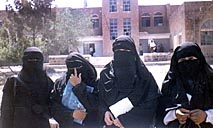
Results of a Yemen Times Survey of 316 Female High School Graduates [Archives:1999/10/Reportage]
March 8 1999
By: Ahlam Al-Khawlany,
and other YT Staff,
Sanaa.

Of the total number of women polled, whose ages range from 19 to 21 years, only 6% were found to be married. That immediately points to a significant delay in the marriage age for Yemeni women. However, more that 39.24% of the respondents said that they would immediately marry, and stop their education, if an acceptable man proposes to them.
The random sampling was based on enrollment in four different schools in Sanaa city. These are Khowlah Bint Al-Azwar, Aeyishah, Arwa and Shuda’a Assabeen. Last year’s graduates in Safiyah and Bab al-Yemen in Sanaa were also polled. The written questionnaire was distributed to around 400 persons during 26/2 – 3/3/1999. Exactly 316 women returned the filled-in forms.
The six-question form is simple, as follows:
1. Age:
2. Present level of education?
3. Do you want to continue your education?
4. What is the field of education that you prefer?
5. If unmarried, would you marry right away and stop your education, if an acceptable groom proposes?
6. Do you want to be a career person? What line of work do you aspire?
Education was a priority for most of the women surveyed. Exactly 60.76% said that they are not ready to marry because they have to pursue their education, or that they would only marry if their partner would allow them to continue their education.
Three fields of education featured more prominently in the preferences of the women who plan to join the university. First and foremost was the field of languages – English and French languages and literature having taken top place – 31%. The second field of preferred study is political science – 22.8%. As if President Ali Abdullah Saleh’s existing headaches were not enough, the young women say they want to join politics. The third highest category of educational preference was medicine – 17.7%.
Other fields of study which also featured were business (7.9%), engineering (6.33%), and home architecture or decoration (5.7%).
Surprisingly, humanities and arts, and sharia/law – two traditionally female-dominated fields of study, ranked low – 3.2%, and 2.5%, respectively. The new field of computer science and informatics also came low in the priorities. Only 1.6% women opted for it. It is believed that lack of knowledge of the opportunities rather than lack of interest explains the low figure for computer science. The fact that the field does not exist in Yemeni universities could also account for the low choice.
In terms of career, most of the respondents stated that they were going to be career women. Interestingly, the thoughts went towards the private sector, and even more specifically towards starting their own small enterprises. At least 50% thought they would start their own businesses.
However, 105 women or 33.2% think of joining the government service, primarily as teachers.
But not all women wanted to go to work, as 45 of the respondents or 14.24% thought they don’t mind staying at home and raising children and looking after the ‘home business’.
Of course, the sample is too small, and too skewed geographically and in range to allow generalization of the results. But the results do serve as indicators of vital dynamics in our society.
——
[archive-e:10-v:1999-y:1999-d:1999-03-08-p:./1999/iss10/report.htm]


